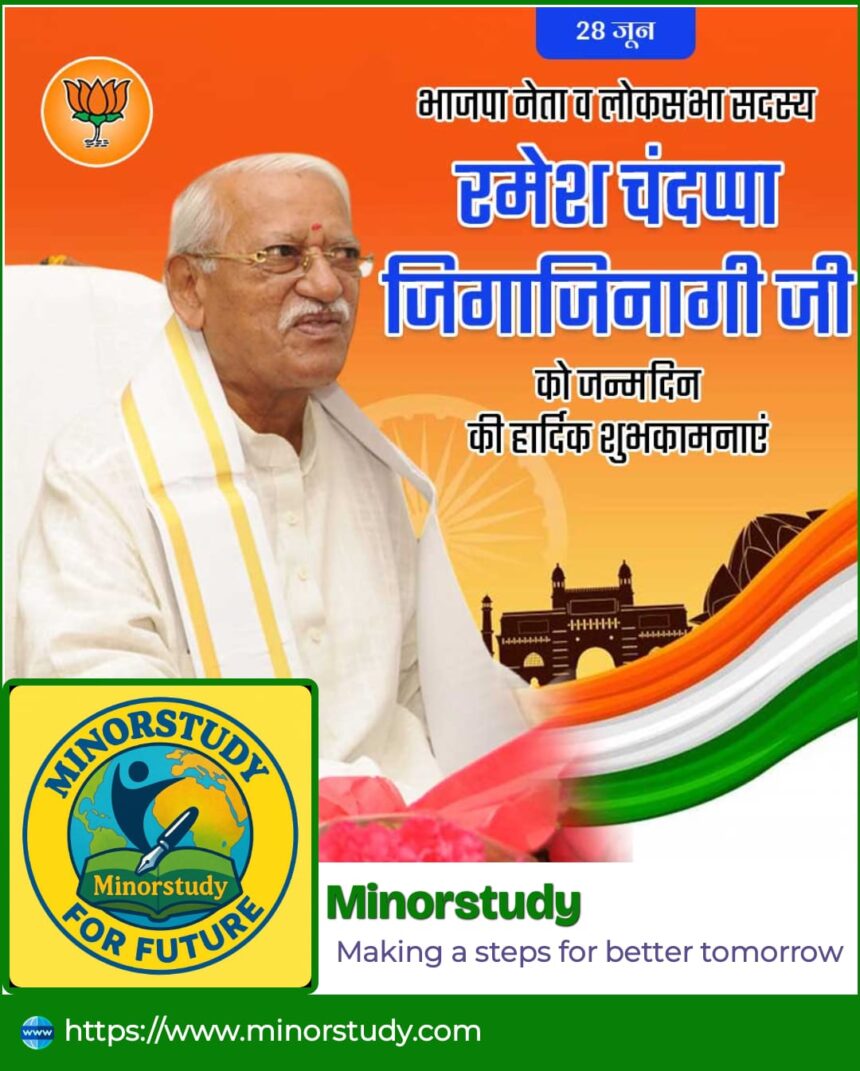🌟 Introduction: A Leader Rooted in the Soil
Ramesh Chandappa Jigajinagi Ji: In the vibrant landscape of Indian democracy, leaders emerge from all walks of life. Ramesh Chandappa Jigajinagi Ji is one such towering figure who rose from humble beginnings to become a stalwart voice for the marginalized and underrepresented. With deep roots in Karnataka and an unwavering commitment to public service, his journey from a rural background to the Indian Parliament is both inspiring and significant for the nation.
- 🌟 Introduction: A Leader Rooted in the Soil
- 📜 History of Ramesh Chandappa Jigajinagi Ji
- 📊 Timeline: Life and Career Milestones
- 🧩 Key Facts About Ramesh Chandappa Jigajinagi Ji
- 1. Champion of the Marginalized
- 2. Impressive Parliamentary Career
- 3. Ministerial Contributions
- 4. Grassroots Connect
- 5. Proponent of Rural Development
- 6. Non-Controversial and Disciplined Politician
- 7. Voice for Education
- ❓ FAQs About Ramesh Chandappa Jigajinagi Ji
- 🎯 Significance in Indian Politics
- 🎉 Observance and Public Appreciation
- 💡 Important Points to Remember
- 🌿 Impact on Daily Life
- 💬 Wishing and Inspirational Message
- 🧠 Why He’s Important to Society
- 🏁 Conclusion: A Beacon of Empowerment
📜 History of Ramesh Chandappa Jigajinagi Ji
Born on 28 June 1952, in Atharga village, Bijapur district (now Vijayapura), Karnataka, Ramesh Jigajinagi hails from a Scheduled Caste (SC) community. His early years were spent in a rural setting where access to education and opportunities was limited. Despite these constraints, he completed his Bachelor’s degree and later entered politics to advocate for social justice and equality.
His father, Shri Chandappa Jigajinagi, was a freedom fighter, which deeply influenced Ramesh Ji’s patriotic values and political ambitions.
📊 Timeline: Life and Career Milestones
| Year | Event |
|---|---|
| 1952 | Born in Atharga village, Bijapur (Karnataka) |
| 1983 | Elected to Karnataka Legislative Assembly (JDS) |
| 1998 | First elected to the 12th Lok Sabha (Bijapur) |
| 1999 | Re-elected to 13th Lok Sabha |
| 2004 | Re-elected to 14th Lok Sabha |
| 2009 | Re-elected to 15th Lok Sabha |
| 2014 | Re-elected to 16th Lok Sabha; became Union Minister of State for Drinking Water and Sanitation |
| 2019 | Re-elected to 17th Lok Sabha |
| 2024 | Continues to represent Bijapur, active in development policies |
🧩 Key Facts About Ramesh Chandappa Jigajinagi Ji
1. Champion of the Marginalized
Ramesh Ji has consistently advocated for the welfare of Scheduled Castes and Tribes, pushing for equitable representation in government schemes and job opportunities.
2. Impressive Parliamentary Career
He has been elected to the Lok Sabha seven times — a rare feat that speaks volumes about the trust and support he enjoys from his constituents.
3. Ministerial Contributions
As Union Minister of State for Drinking Water and Sanitation (2016–2019) under PM Narendra Modi’s government, he played a pivotal role in the Swachh Bharat Abhiyan and other rural health initiatives.
4. Grassroots Connect
Despite holding high offices, Ramesh Ji is known for his regular visits to his constituency, interaction with people at the ground level, and his approachable nature.
5. Proponent of Rural Development
He has focused on rural electrification, road development, and sanitation — improving living standards across remote Karnataka districts.
6. Non-Controversial and Disciplined Politician
In an era where politics often becomes synonymous with disruption, he is respected for being calm, rational, and constructive in Parliament.
7. Voice for Education
He has supported scholarships, girl child education, and rural schools — acknowledging that education is key to empowerment.
❓ FAQs About Ramesh Chandappa Jigajinagi Ji
Q1: What party does Ramesh Jigajinagi belong to?
He is a senior leader from the Bharatiya Janata Party (BJP).
Q2: Which constituency does he represent?
He represents the Bijapur (Vijayapura) Lok Sabha constituency in Karnataka.
Q3: What ministries has he served in?
He served as the Minister of State for Drinking Water and Sanitation in Narendra Modi’s cabinet.
Q4: What is his educational background?
He holds a Bachelor’s degree, and was among the few educated youth from his village during his time.
Q5: What makes him unique as a leader?
His commitment to marginalized communities, clean image, and consistency in Parliament make him stand out.
🎯 Significance in Indian Politics
Ramesh Ji is not just a politician; he is a symbol of perseverance. His rise from a rural background to national prominence sends a strong message: With dedication and integrity, even the most marginalized can shape national policies.
He has worked on:
SC/ST empowerment
Drinking water access
Village sanitation
Infrastructure in backward areas
His policy focus aligns with the core goals of inclusive development — something India strives for in the 21st century.
🎉 Observance and Public Appreciation
While there isn’t a formal “observance” for Ramesh Ji, his birthdays (28th June) are celebrated locally in Karnataka by political workers and community groups who organize:
Health camps
Scholarship events
Sanitation drives
His name often comes up in community gatherings as an example of integrity and service.
💡 Important Points to Remember
Longest-serving MP from Bijapur
Known for his simple lifestyle and humility
Advocate for clean drinking water access
Part of major BJP-led rural development schemes
Never lost sight of his roots despite national status
🌿 Impact on Daily Life
Policies spearheaded or supported by Ramesh Ji have improved:
Drinking water availability in drought-prone villages
Toilet construction and hygiene awareness
Road connectivity in tribal areas
Skill development programs for SC/ST youth
Healthcare awareness in backward regions
These aren’t just policies — they translate into real-life benefits for lakhs of people across Karnataka and India.
💬 Wishing and Inspirational Message
On his upcoming birthday or political anniversary, one might say:
🪷 “Wishing Ramesh Chandappa Jigajinagi Ji continued strength and wisdom in his mission to uplift the marginalized. Your life is an inspiration for generations to believe in democracy and service.” 🌿
🧠 Why He’s Important to Society
In a society still battling caste discrimination, economic disparity, and rural underdevelopment, leaders like Ramesh Ji show how meaningful change can happen from within the system. He stands as:
A role model for Dalit youth
A benchmark for ethical politics
A catalyst for rural progress
🏁 Conclusion: A Beacon of Empowerment
In Indian politics, where turbulence is frequent and integrity often questioned, Ramesh Chandappa Jigajinagi Ji is a beacon of hope and humility. His contributions are not just confined to speeches and bills, but are visible in the clean water taps of remote villages, the smiles of educated rural children, and the confidence of marginalized voices.
In celebrating his journey, we are reminded that politics, at its best, is about service, inclusion, and nation-building.








